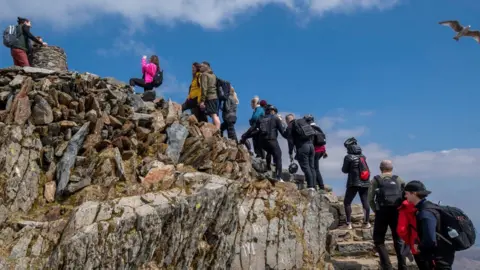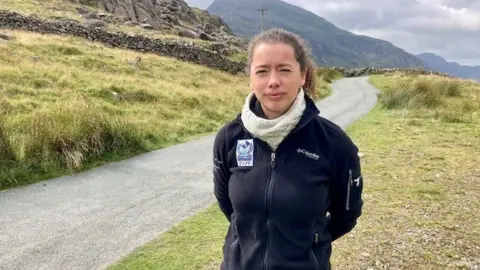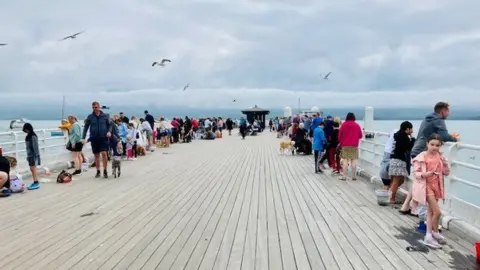Staycation: Tourism rethink needed after north Wales boom
Better infrastructure is needed to cope with the influx of people visiting north Wales, tourism leaders have said.
The call comes after destinations experienced one of the busiest periods on record, with queues on Snowdon among "the worst" some can remember.
"Struggling communities" say more needs to be done to help spread tourists out among quieter beaches and car parks.
The Welsh government said money had been put in place to manage extra visitor numbers.
Anglesey council urged visitors to plan ahead before heading to the island over the bank holiday weekend, adding people had a "duty of care to respect and look after one another."
About 700,000 people now visit Snowdon each year, compared with about 500,000 in 2018, but dealing with the economic boom has proved difficult for some.
Nia Rhys Jones, from the Anglesey Tourism Association, said getting the balance between economic benefits and safeguarding communities was a challenge.
"It's been a dilemma for us as an association throughout the pandemic - how to keep the communities safe more than anything," she said.
"There's a need for everyone to come together - the council and other stakeholders - and ensure that events happen in different places on different days."
She also said the infrastructure of "quieter beaches and quieter car parks" needed to be looked at.
However, Ms Rhys Jones thought "the term 'staycation' is here to stay" after attracting people who would initially choose to holiday abroad next year.
 Getty Images
Getty ImagesAfter north Wales earned its place on a list of the most popular holiday destinations this year, police said anti-social behaviour and parking had been a problem in areas like Ogwen and Llanberis.
To prevent overcrowding in popular areas, the Snowdonia National Park Authority (SNPA) has introduced some changes to parking arrangements and is confident they have made a difference.
At Pen y Pass car park - where some of Snowdon's most popular paths start - there is a booking system in place. It was trialled last year, and the authority said it had been a success again this summer.
But there are concerns of further demand in the future.
The SNPA said it would be spending the next few months looking at how to strike a balance between the needs of visitors to Snowdonia and the people who live there.

'Difficult time ahead'
"This year's been fantastic for businesses," Helen Pye, SNPA's head of engagement, said. "But communities are struggling under the strain of visitors - and it's areas that perhaps haven't dealt with that sort of pressure before.
"As we approach winter, I think we need to think carefully - because we expect next year to be busy too - with the numbers coming here and the lack of infrastructure, we have big problems.
"I think we need to take a step back and ask, 'what do we really need out of our tourism?' In north Wales in particular, especially when it comes to how people feel, I don't think it's all about the money.
"It's more important that people can live in their communities, that they can enjoy where they live and that there's respect for the area above all," she added.

Anglesey council has previously said it was working with partners to encourage visitors to use common sense when visiting popular areas.
Economy Minister Vaughan Gething said: "Amid increased customer demand from eased Covid-19 rules and more people choosing domestic holiday destinations this summer, Visit Wales' Addo campaign has been running since restrictions began to be lifted in March.
"The campaign has encouraged the people of Wales and visitors to look after each other and to remain respectful of the countryside and the communities we visit."
As the bank holiday weekend approaches, Mr Gething urged people to "look for quieter locations, plan your visit and treat each other and the places you visit with respect".
He added: "The Welsh government has worked closely with a range of partners, including the national park and local authorities to help them plan carefully and safely, and put mitigation measures in place.
"Funding has been available to these authorities to support additional costs of managing increased visitor numbers."
